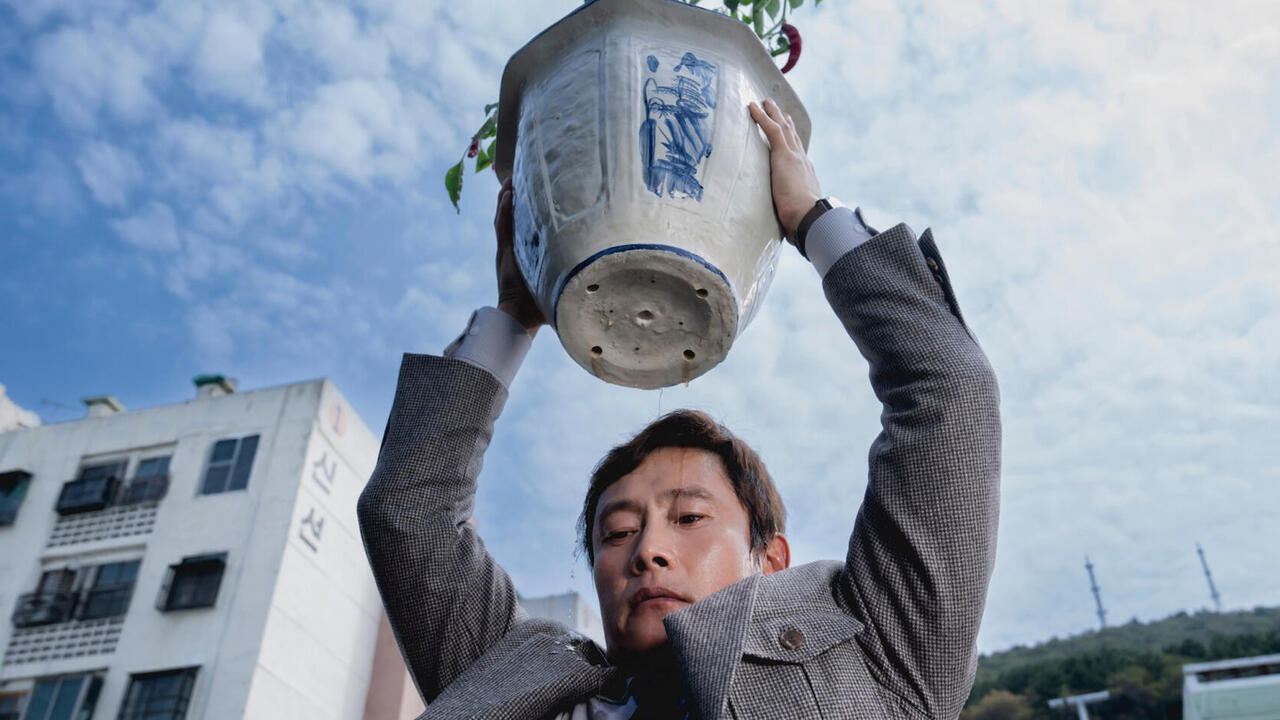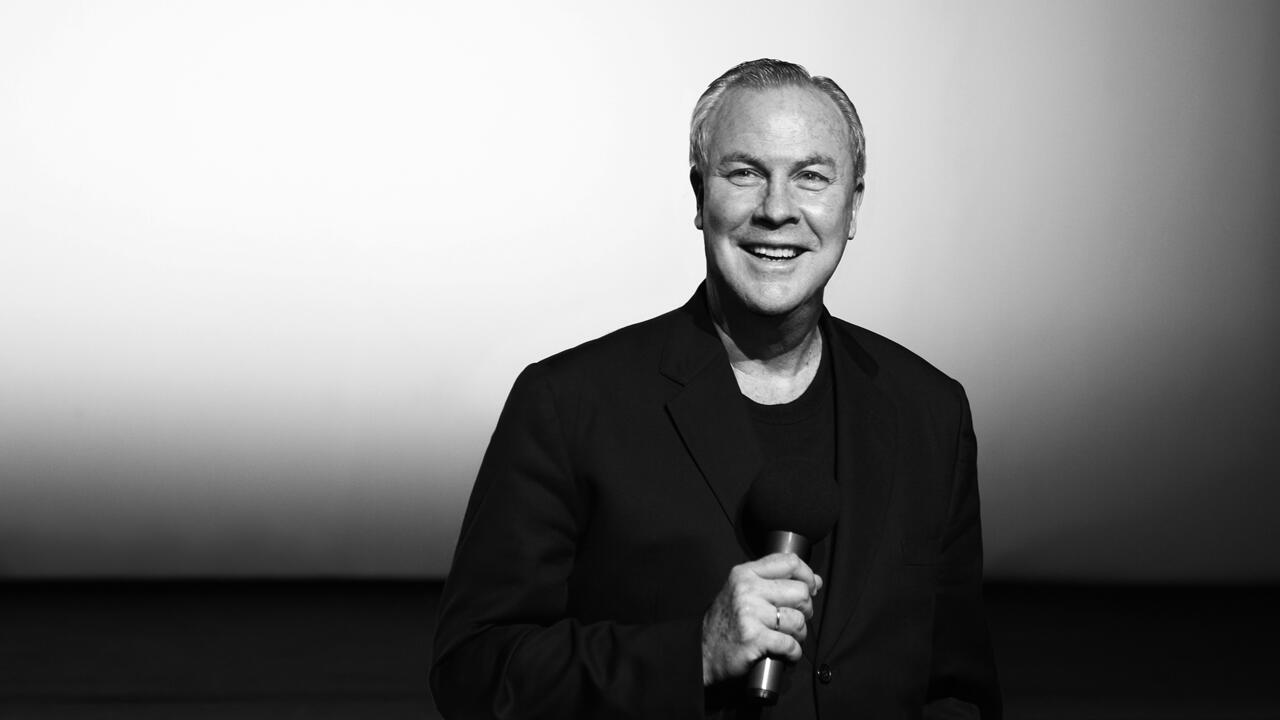Shoot the Messenger
Jan Verwoert on friction between the creative worker and the local boardroom
Jan Verwoert on friction between the creative worker and the local boardroom

I’m standing in a department store studying the range of trolley suitcases on offer, when a total stranger starts shouting at me: ‘You’re one of them, the managers, the henchmen!’ I stammer something about art, music, no money. The response is more of the same: ‘Henchman! Henchman!’ From this I learn: travel with a rucksack, not a trolley suitcase. Today, people distinguish not between master and servant, but between ‘us’ and ‘them’ – ‘them’ being the henchmen. And it’s for ‘us’, not you, to decide whether your traits reveal the ugly face of capitalism.
After the recent flare-up surrounding the change of director at the Volksbühne theatre in Berlin, this scene came to mind and the word ‘henchman’ rang in my ears again. Not because I feel especially close to the new appointee at Volksbühne, Chris Dercon, currently director of the Tate Modern in London, whom I don’t know personally. But I’m irritated by the language used by the theatre’s staff in an open letter to describe what they think he represents: ‘This change stands for historical levelling of identity. The artistic processing of conflicts in society is to be suppressed in favour of a globally consensual culture with uniform patterns of performance and marketing.’ Levelling of identity? Suppressed by a globally consensual culture? Hito Steyerl has expressed her unease at such polarizations in a discussion thread at e-flux conversations. She fully respects the necessity of workplace struggles. ‘But’, she says, ‘many current global conflicts are generally flattened to “metropolitan elites” vs. “indigenous oppressed”.’ Such resentments are not new: in 1951, she points out, Hanns Eisler heard from East Germany’s ruling party newspaper Neues Deutschland that a ‘rootless cosmopolitan’ should not be directing plays in Berlin. In Steyerl’s view, such rhetoric is a dead end. I think she’s right.
This is not just about Berlin. In many places, the euphoria of the European opening of the 1990s is now giving way to suspicions that the children of an art world without borders and Iron Curtains might be the henchmen of a uniform global culture contaminated by money. This rootless guild includes curators, intellectuals and artists who move from place to place for jobs and projects. Marx called them ‘virtuosos’. Itinerant producers, wandering magicians is what they are, skilled in pulling ideas out of a hat, sorting out messes, and bringing things into being. These people are now starting to register a change of atmosphere in Europe.
As a rootless wanderer, you are ground down between two fronts: the arbitrary actions of local decision-makers and the ire of local staff (caused by this same arbitrariness). On the one side stand executives or culture secretaries with little knowledge of the everyday routine at the institutions in question. They sure don’t want to have to worry about details and they look for someone with an international reputation for making things run smoothly. What actually makes things run smoothly, nobody knows. As a result, no firm commitments are made. And suddenly you’re a curator. Or head of an institute. Or director of a theatre. But your employer feeds you to the lions of local politics. Until a few years ago, this would have meant no more than the head of the board of a Kunstverein stirring up animosity against their own newly appointed artistic director. Today, people are fired immediately. As a tutor on the curating course at De Appel in Amsterdam, I experienced this first-hand. The new director of the course and exhibition venue, Lorenzo Benedetti, was abruptly thrown out at a moment’s notice (first described by the press as a Netherlands resident, later ‘the Italian curator’). The whole thing unfolded like a club owner firing a DJ with the words: ‘What kind of music is that? Where’s the boom boom?!’ The official version was that De Appel was to become like London’s Serpentine Gallery. I have looked the executive committee in the eye (most of them are Amsterdam tourism lobbyists) and I swear that none of them have ever spent more than two minutes inside the Serpentine.
Referring to power that is so divorced from diligence as ‘neoliberal’ is going too far. It is simply banal, provincial and stupid. The firings of Clémentine Deliss from the ethnographic museum in Frankfurt and of Mihnea Mircan from Extra-City in Antwerp followed a similar pattern, as described by Bart De Baere in Metropolis M: ‘X is an outstanding curator, but …’. In other words: ‘We don’t know what we want, but it definitely isn’t you. Ciao.’
It’s bad enough when municipal potentates don’t really relate to art but would like to have some anyway to show off. But it’s worse when, as in Lund, Sweden, they consider closing the Kunsthalle, arguing they prefer to offer something more child-friendly for normal citizens. Or, as in Warsaw, when the Ministry of Culture urges the city’s international poster biennale to focus on the theme of national heroes for a change.
What to do when you know that nothing can protect you, not even your reputation? They hired you for your magic powers. So you deploy them to the full, you really go to town. As a result, before you know it, you have the entire staff against you. All they see in you is: this person who is piling on the pressure, knows no limits, is messing with our workload. Focusing on these key points, an anonymous group of staff at the Royal Academy of Art in Stockholm compiled a thick dossier of the most insidious accusations against American-born director Marta Kuzma and sent it to the local press (who, hungry for scandal, printed it unchecked) and, when she left, they sent it to Yale, her future employer. Long knives. Scandinavian noir. Wallander, to the rescue!
I have a story of my own to tell here. Ever since I’ve been teaching at the Academy in Oslo, at meetings, my favourite colleague always gives me silent looks that seem to say: ‘You’ve brought the plague to the village.’ He’s right: the plague of visible poverty. As a stranger among those enriched by oil, life in the world’s second most expensive city after Tokyo has made me so poor that I have to slave away round the clock on other work to stay out of debt. With no means of concealing it, I stand before the Norwegians as a grotesque embodiment of all of the evils of the new reality: no home, no money, no time, aggressive, depressed, explosive. And if anyone says ‘more fool you!’ I’ll bite their head off!
The political message? Don’t shoot the messengers! They have no place to hide. When they come in through the city gate, everyone sees that their bodies show symptoms. They must be the source of the illness. Stick them in the lazaretto! Isolation, not solidarity – like in the Middle Ages.
The urgent question here is: Where is the political subject? Often enough, it seems, there is no one at the controls of the apparatus. The situation is marked by hollow words and absurd decisions (Dercon? At the Volksbühne?!). Locals feel disempowered and respond with resentment. Wanderers between the worlds bang their heads against walls. Some act helplessly. Others become monsters. The modern cliché of the arrogant critic becomes the grotesque vision of the star curator on a power trip. Everyone can think of examples. Is that all there is? Is the political stage peopled only by zombies, with no free agents in sight?
When, after much collective wrangling over how to rescue De Appel, a door opened at Amsterdam’s town hall and a motley group of supporters turned up to the meeting, it struck me: Damn, life experience counts for something. It lends credibility. Names don’t matter. The municipal officials didn’t know us, and we didn’t know them. But in the discussion, it became clear: these are people who live for education and exhibition-making; we can’t let their institution die. In this way, little by little, political will takes shape. If a door opens. If not, as I have seen in Norway, you find out what it means to be a foreigner in a rich country: You thought you were there to give these people something (that you know). They think you’ve come to take some-thing (that they have). They show you this discretely or openly. And, believe me, your hate grows inside. Politics begins with sharing experiences. In art and on the street. Happy the town where such an exchange takes place.
Translated by Nicholas Grindell























